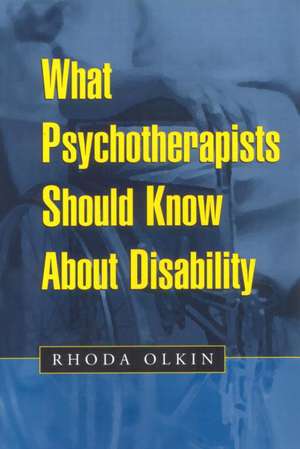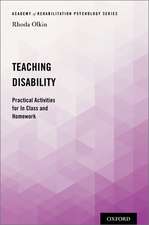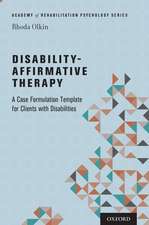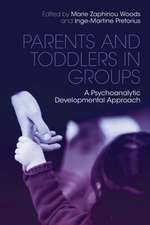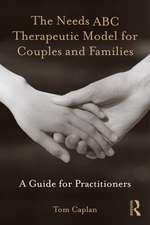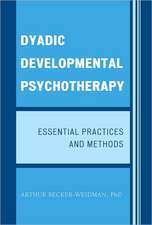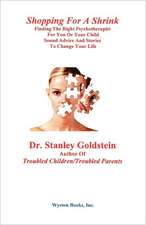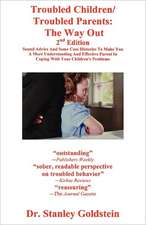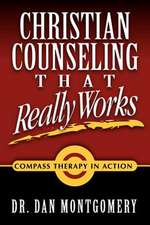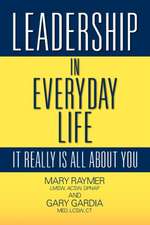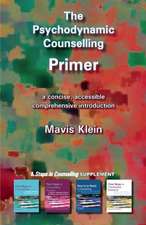What Psychotherapists Should Know About Disability
Autor Rhoda Olkinen Limba Engleză Paperback – 5 apr 2001
This comprehensive volume provides the knowledge and skills that mental health professionals need for more effective, informed work with clients with disabilities. Combining her extensive knowledge as a clinician, researcher, and teacher with her personal experience as someone with a disability, Olkin provides an insider's perspective on critical issues that are often overlooked in training. A lucid conceptual framework is presented for understanding disability as a minority experience, one that is structured by social, legal, and attitudinal constraints as well as physical challenges. Illuminating frequently encountered psychosocial themes and concerns, chapters describe a range of approaches to dealing with disability issues in the treatment of adults, children, and families. Topics addressed include etiquette with clients with disabilities; special concerns in assessment, evaluation, and diagnosis; the impact of disability on sexuality and romance, as well as pregnancy, birthing, and parenting; the use of assistive technology and devices; disability and substance abuse; and more. Filled with clinical examples and observations, the volume also discusses strategies for enhancing teaching, training, and research.
Preț: 294.08 lei
Preț vechi: 309.56 lei
-5% Nou
Puncte Express: 441
Preț estimativ în valută:
56.28€ • 58.54$ • 46.46£
56.28€ • 58.54$ • 46.46£
Carte tipărită la comandă
Livrare economică 15-29 aprilie
Preluare comenzi: 021 569.72.76
Specificații
ISBN-13: 9781572306431
ISBN-10: 1572306432
Pagini: 368
Dimensiuni: 152 x 229 x 25 mm
Greutate: 0.49 kg
Ediția:Revised
Editura: Guilford Publications
Colecția Guilford Press
ISBN-10: 1572306432
Pagini: 368
Dimensiuni: 152 x 229 x 25 mm
Greutate: 0.49 kg
Ediția:Revised
Editura: Guilford Publications
Colecția Guilford Press
Public țintă
Professional and Professional Practice & DevelopmentCuprins
Introduction and Overview
1. Who Are People with Disabilities?
2. The Minority Model of Disability
3. The Disability Experience: I. Stereotypes and Attitudes
4. The Disability Experience: II. Affect and Everyday Experiences
5. Families with Disabilities
6. Laws and Social History
7. Beginning Treatment
8. Etiquette with Clients with Disabilities
9. Interviews, Assessment, Evaluation, and Diagnosis
10. Dating, Romance, Sexuality, Pregnancy, Birthing, and Genetic Testing
11. Special Issues in Therapy with Clients with Disabilities
12. Assistive Technology and Devices
13. The Personal, the Professional, and the Political
14. Research on Disability: Shifting the Paradigm from Pathology to Policy
15. For Teachers and Supervisors
1. Who Are People with Disabilities?
2. The Minority Model of Disability
3. The Disability Experience: I. Stereotypes and Attitudes
4. The Disability Experience: II. Affect and Everyday Experiences
5. Families with Disabilities
6. Laws and Social History
7. Beginning Treatment
8. Etiquette with Clients with Disabilities
9. Interviews, Assessment, Evaluation, and Diagnosis
10. Dating, Romance, Sexuality, Pregnancy, Birthing, and Genetic Testing
11. Special Issues in Therapy with Clients with Disabilities
12. Assistive Technology and Devices
13. The Personal, the Professional, and the Political
14. Research on Disability: Shifting the Paradigm from Pathology to Policy
15. For Teachers and Supervisors
Notă biografică
Rhoda Olkin, PhD, is a professor in the clinical psychology program at the California School of Professional Psychology in Alameda, California. She is also on the staff of Through the Looking Glass in Berkeley, California, an agency serving families with disabilities, and the National Resource Center for Parents with Disabilities. She has experience in disability from the perspective of an administrator (she founded handicapped services at the University of California, Santa Barbara, in the mid-1970s, and is currently the Faculty Advisor to Students with Disabilities at the California School of Professional Psychology), researcher, clinician, teacher, and spouse (of a man with multiple sclerosis), as well as personal experience (she had polio in 1954). Her short stories have been published in literary magazines, and her most recent story on a disability theme appears in Bigger Than the Sky: Disabled Women on Parenting. Her two children can spot ramps and handicapped parking with the best of them.
Recenzii
Simply put, this is the best book on psychotherapy I've read in years. It is not only a superb guide to treating clients with disabilities; it is also an eloquent reminder of what systems-oriented therapy at its most creative can actually be. More broadly, Olkin opens us up to a compelling vision of how clinicians, teachers, and researchers can play an active role in ushering in a more just and diversity-valuing society. --Morris Taggart, PhD, Psychologist and Family Therapist
This book is destined to become a classic. It is by far the most comprehensive and well-written text on the topic. Psychologists, social workers, educators, human resource specialists, and employers will find much of value. Olkin not only does a masterful job of integrating theory, research, and practice; she also communicates the human dimensions of disability. She speaks passionately and forcefully, providing personal insights that help readers understand the experiential reality of disability. This book is helping me to confront biases, stereotypes, and discomfort that may obstruct my interactions with students, clients, and acquaintances with disabilities. I am confident that it will make me a more effective clinician. This is a 'must read' for helping professionals and educators. --Derald Wing Sue, PhD, President, Society for the Psychological Study of Ethnic Minority Issues, Division 45 of the American Psychological Association
Olkin has produced a comprehensive and penetrating analysis of the significant issues that impact upon the lives of people with disabilities. Organized, concise chapters address dating and romance, sexuality, advocacy, discrimination and stress, treatment and pain, and a plethora of other significant topics. The bibliography is outstanding. This book is not just for psychotherapists--it is a vital resource for anyone who studies disability or is involved in the care or treatment of people with disabilities. --Mark Nagler, PhD, Professor of Sociology and Disability Studies, Department of Sociology, Renison College, University of Waterloo, Canada
This book is a groundbreaking bridge between the disability community and the mental health profession. A comprehensive and practical resource containing a thorough review of the literature, it is replete with original analyses and illustrative clinical vignettes. Olkin's humor, honesty, and sharing of personal disability experience make this an absorbing work. It will inform mental health trainees and will be of interest to practitioners and researchers, whether or not they have disability expertise. --Megan Kirshbaum, PhD, Executive Director, Through the Looking Glass; Co-Director, National Resource Center for Parents with Disabilities, Berkeley, California
Counseling students can greatly benefit from learning more about working with people with disabilities. I try to integrate this topic in every course I teach. --Susan H. Packard, Graduate Education-Counseling Department, Gwynedd-Mercy College
-This book is destined to become a classic. It is by far the most comprehensive and well-written text on the topic. Psychologists, social workers, educators, human resource specialists, and employers will find much of value. Olkin not only does a masterful job of integrating theory, research, and practice; she also communicates the human dimensions of disability. She speaks passionately and forcefully, providing personal insights that help readers understand the experiential reality of disability. This book is helping me to confront biases, stereotypes, and discomfort that may obstruct my interactions with students, clients, and acquaintances with disabilities. I am confident that it will make me a more effective clinician. This is a 'must read' for helping professionals and educators. --Derald Wing Sue, PhD, President, Society for the Psychological Study of Ethnic Minority Issues, Division 45 of the American Psychological Association
Olkin has produced a comprehensive and penetrating analysis of the significant issues that impact upon the lives of people with disabilities. Organized, concise chapters address dating and romance, sexuality, advocacy, discrimination and stress, treatment and pain, and a plethora of other significant topics. The bibliography is outstanding. This book is not just for psychotherapists--it is a vital resource for anyone who studies disability or is involved in the care or treatment of people with disabilities. --Mark Nagler, PhD, Professor of Sociology and Disability Studies, Department of Sociology, Renison College, University of Waterloo, Canada
This book is a groundbreaking bridge between the disability community and the mental health profession. A comprehensive and practical resource containing a thorough review of the literature, it is replete with original analyses and illustrative clinical vignettes. Olkin's humor, honesty, and sharing of personal disability experience make this an absorbing work. It will inform mental health trainees and will be of interest to practitioners and researchers, whether or not they have disability expertise. --Megan Kirshbaum, PhD, Executive Director, Through the Looking Glass; Co-Director, National Resource Center for Parents with Disabilities, Berkeley, California
Counseling students can greatly benefit from learning more about working with people with disabilities. I try to integrate this topic in every course I teach. --Susan H. Packard, Graduate Education-Counseling Department, Gwynedd-Mercy College
A refreshing addition to a body of literature which usually lacks any alternative to the medical model....A very useful resource for teaching alternative ways to perceive disability.
--Review of Disability Studies, 1/7/2001ƒƒA valuable, insider's view of being on the outside....In addition to educating us about the social stigma these clients face, [this book] is full of practical resources and recommendations.
--Networker, 1/7/2001ƒƒDr. Olkin is able, because of her own experience with disability and because of her experience through her work with people with disabilities, to set the story straight and to expose the myths and fallacies that have existed for centuries.
--Disability Studies Quarterly, 1/7/2001Descriere
This comprehensive volume provides the knowledge and skills that mental health professionals need for more effective, informed work with clients with disabilities. Combining her extensive knowledge as a clinician, researcher, and teacher with her personal experience as someone with a disability, Olkin provides an insider's perspective on critical issues that are often overlooked in training. A lucid conceptual framework is presented for understanding disability as a minority experience, one that is structured by social, legal, and attitudinal constraints as well as physical challenges. Illuminating frequently encountered psychosocial themes and concerns, chapters describe a range of approaches to dealing with disability issues in the treatment of adults, children, and families. Topics addressed include etiquette with clients with disabilities; special concerns in assessment, evaluation, and diagnosis; the impact of disability on sexuality and romance, as well as pregnancy, birthing, and parenting; the use of assistive technology and devices; disability and substance abuse; and more. Filled with clinical examples and observations, the volume also discusses strategies for enhancing teaching, training, and research.
